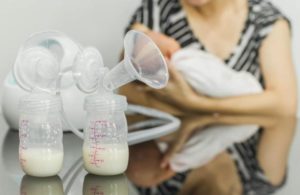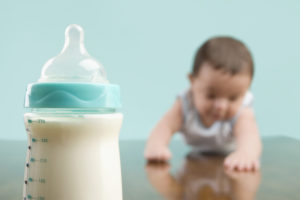Content
The benefits and harms of breastfeeding is an urgent issue for young mothers, causing a lot of controversy. To understand it to the end, you need to study all the advantages and disadvantages of breastfeeding.
Breast milk composition
The benefits of breastfeeding newborns are rarely disputed. The fact is that breast milk is an ideal nutrient mixture, which contains all the necessary substances. It contains the following useful components:
- water - it takes 88% of the total volume and fully satisfies the baby's fluid needs, so there is no need to water the baby additionally;
- carbohydrates - they occupy 7% and consist mainly of lactose;
- fats - 4% of the composition is allocated to their share, cholesterol, basic hormones and bile are present among fats;
- proteins - they are 1% in milk, they are represented by taurine, nucleotides, lactase, lactoferrin, lipase and whey protein;
- minerals, vitamins, leukocytes, antibodies and growth hormones - they occupy 0.2% of the total volume.
It is very important that the composition is perfectly balanced - the child receives useful components in exactly the proportions in which it is necessary.

Types of breast milk
The unique properties of breast milk lie in the fact that during feeding it slightly changes its useful composition. There are three types of it:
- Colostrum - this milk is produced during the first few days of breastfeeding. Colostrum contains a higher content of salts, vitamins and proteins, while less fat and lactose are present in it. In the first days of life, it is the calorie content of nutrition that is very important for the child, and nature has made sure that the baby receives all the necessary benefits.
- Transitional milk - Approximately 5 days after delivery, the fat content in milk increases, and the balance of the remaining components approaches that of normal breast milk.
- Mature milk, it appears 2 or 3 weeks after giving birth, and it is on it that the baby eats until the end of breastfeeding. The composition and properties of such milk continue to change slightly, the volume of fat in it increases, but not so much as to further distinguish separate categories.
Why breast milk is good for your baby
The main argument for breastfeeding is the benefits of breastfeeding for the baby. It has been proven that not artificial formula, but mother's milk in the first months of life, has the most positive effect on the health of the child.

Strong immunity
When breastfeeding, the baby is much less susceptible to viruses and infections.Vitamins and special enzymes in breast milk are beneficial in that they strengthen the baby's immunity - he grows quickly, gets sick less often, does not lag behind the age norm. Breastfeeding prevents the development of anemia and diabetes in the child, numerous ailments of the stomach and intestines.
Establishing contact
A useful property of breastfeeding is that it helps establish a deep emotional connection between mother and baby. The baby, attached to the breast on the first day after childbirth, grows much calmer than peers who are bottle-fed. Subsequently, the child feels stronger attachment and love for the mother.
Reducing the risk of developing diseases
The beneficial properties of breast milk protect the developing baby's body from many ailments. Since the composition of the natural nutritional formula is perfectly balanced, the child does not experience a lack of vitamins and minerals and does not suffer from an excess of them. The intestinal, nervous, cardiac, musculoskeletal systems develop correctly and without hindrances, so the child grows healthier.

Weight control
In healthy breast milk, fats are present exactly in the amount in which they are not able to harm the baby. With natural feeding, muscle and fat tissues are evenly distributed in the child's body. The baby does not suffer from obesity, the risk of acquiring early diabetes or hypertension is reduced.
Healthy sleep and wellness
The benefit of breastfeeding is that it has a calming effect on the baby. Due to its properties, the child sleeps better and wakes up less often at night, does not cry so often.
But after using artificial mixtures, they often arise, store-bought baby food can harm the body.
Healthy teeth
In the process of sucking on the mother's breast while feeding, the baby forms the correct bite. In the future, this allows you to avoid the development of caries - bacteria do not accumulate in hard-to-reach places, and brushing your teeth becomes as effective as possible.
Why breastfeeding is good for moms
Breastfeeding a baby is a process whose properties benefit not only the baby, but also the woman herself. Research confirms that feeding protects young mothers from many diseases and helps maintain well-being.

Fast recovery after childbirth
In the first time after childbirth, a woman's body experiences deep stress. Healthy feeding helps to cope with it easier and faster. So, immediately after childbirth, breastfeeding promotes the separation of the placenta, and this reduces the risk of further bleeding and prevents the development of anemia.
Also, when breastfeeding, oxytocin is produced in the mother's body, a useful hormone responsible for contracting the muscles of the uterus and returning it to its normal state. When breastfeeding, the abdominal organs that have slightly shifted during pregnancy return to their natural position more quickly.
Prevention of breast, ovarian and uterine cancer
Several studies have shown that breast and reproductive cancers often develop in women with an increase in the hormone estrogen. Since during breastfeeding, prolactin is actively produced, which suppresses estrogen, the risk of breast cancer is reduced by 50%, and the risk of cancer of the ovaries and uterus - by 22%.
Prevention of osteoporosis and strengthening of bones
During breastfeeding, a woman's body absorbs calcium especially well. In addition, this substance is present in the diet of a young mother in an increased volume - after all, for a healthy feeding, a woman must carefully monitor her diet.

Calcium not only benefits the baby - there will be no harm to the mother.The risk of developing joint diseases is reduced by about 25%.
Faster weight loss
At the moment, science cannot explain exactly why when breastfeeding, a woman's excess weight goes away faster. But research confirms this fact. If a mother feeds her baby with breast milk for more than 3 months, then she manages to return to prenatal form faster than women who almost immediately weaned the baby.
Reproductive health
In the first time after childbirth, a woman's reproductive system needs a break, and breastfeeding allows for such rest in natural ways.
When breastfeeding, prolactin is produced, which suppresses the hormones estrogen and progesterone. For some time, usually within six months, ovulation in a young mother does not occur, menstruation does not begin. Accordingly, the body during this period is not capable of a new conception.

Reducing the risk of postpartum depression
Due to the dramatic change in life circumstances, many young mothers fall into depression, even those who planned, wanted and expected a child. Breastfeeding eliminates potential emotional harm. When feeding a baby, the mother produces a huge amount of endorphins - as nature intended. A woman often feels happy and calm, does not get annoyed with others, and the situation in the family does not become tense with the birth of a child.
Reducing the risk of diabetes
The beneficial properties of breastfeeding protect a woman from developing diabetes. It has been proven that if a mother feeds her baby naturally for at least six months, her blood sugar level goes down, and the risk of diabetes becomes 47% lower.
Even short-term breastfeeding is not harmful, but beneficial. Women who have breastfed a baby for less than six months are also much less likely to develop diabetes - the risk of developing it is reduced by 25%.
The benefits and harms of breast milk after a year
Weaning a baby too early is harmful. The fact is that after a year of life, the baby's body is not yet ready to fully assimilate "adult" food. He still needs a lot of milk to develop.

Usually, parents try to transfer their children to cow or goat's milk. But the composition of these products is different from the composition of healthy breast milk. Children often have allergies that do not go away even in adulthood, which is unconditional harm.
The beneficial properties of breast milk after a year are that with prolonged feeding, even in the second year of life, it is not necessary to introduce regular milk into the baby's diet. The child's immunity is not overloaded, the acquaintance with "adult" dairy products occurs at an older age, and, as a rule, allergies do not arise after that.
As for the harm from long-term feeding, the negative properties are reflected rather in the mother's condition. In the second year, a woman simply gets tired of feeding a child - after all, she needs to constantly be near the baby, refuse her favorite foods that can potentially harm.
However, in this case, the problem can be solved with the help of expressing - the child is not deprived of proper nutrition, and the woman may feel a little freer. The benefits of expressed breast milk are not much less, and the baby still receives essential nutrients with it.
When to end breastfeeding
In order for the child to have time to get more useful properties during the feeding process, it is recommended to finish it no earlier than one and a half years after giving birth. If you wish, you can continue to latch on the baby to the breast for longer - the benefits of long-term breastfeeding are undeniable.However, there are some risks when the baby needs to be finally transferred to normal food, this can become noticeable stress.

Breastfeeding should only be interrupted early for very good reason.
Breastfeeding rules
In order for the child to receive the maximum benefit during natural nutrition, and there is no harm to the body, basic rules must be observed when breastfeeding.
- The benefits and properties of breast milk are largely determined by the woman's diet. The diet should be varied and balanced, and potentially harmful foods should be avoided during lactation.
- It is important to feed your baby according to the schedule, but you also need to take into account the child's wishes. It is usually recommended to feed your baby every two hours, including at night. However, if the child wanted to eat earlier than usual, he must be fed, there will be no harm from this.
- A young mother should carefully monitor breast hygiene. The mammary glands and nipples should be washed with warm water and neutral soap twice a day; if cracks appear, the nipples should be treated with healing agents. If an infection gets into the wounds, this will not only cause severe discomfort to the mother, but also harm the baby.
Despite the fact that the beneficial properties of breast milk are in demand by a child up to 2 years old, it is still necessary to introduce the first complementary food no later than six months. From this time on, milk should gradually become only an addition to the diet.

Breastfeeding Myths
There are many myths surrounding breastfeeding, and most of them are completely untrue.
- Breast milk loses its beneficial properties after the first year of a child's life. In fact, everything is exactly the opposite - the beneficial properties of the nutrient mixture remain the same. Long-term feeding does not bring harm, but benefit, since it protects the baby's immunity and prevents the development of allergies.
- The amount of milk a woman has depends on how much she eats. The statement is also very far from the truth - the quality of lactation does not depend in any way on the amount of food consumed. The beneficial hormone prolactin is responsible for milk production, and its concentration is determined by how often the mother brings the baby to the breast. Thus, the more often you feed, the better your milk production. However, one cannot argue with the fact that the quality and properties of milk depend on a woman's diet - food should be moderate, but varied and healthy.
- The properties of breast milk change during storage, and it becomes useless. In fact, storing expressed breast milk at room temperature, in the refrigerator, or even in the freezer hardly diminishes its benefits. Rather, on the contrary, for example, freezing reduces the number of bacteria that can potentially harm.

The nutrient mixture also retains its beneficial properties in room heat - up to 4 hours, then it does not begin to harm, but loses its benefits.
Conclusion
The benefits and harms of breastfeeding depend mainly on the quality of the woman's diet and on how well prolactin is produced in her body. Contrary to popular myths, the feeding properties are beneficial even one year after giving birth.
Reviews

